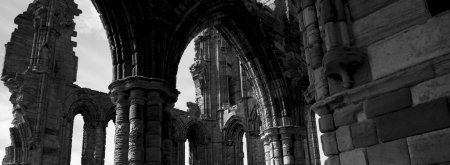The John Lennox - Richard Dawkins Debate
A review of the Lennox - Dawkins debate and the radio interview with Dawkins that followed it
The Context
I was present at the recent debate between Richard Dawkins and John Lennox at The Natural History Museum in Oxford on 21st October 2008, sponsored by the Fixed Point Foundation. I also managed to pin Dawkins down for a ten-minute interview at the reception afterwards and had a mini-discussion with him. The interview was broadcast on Premier Christian Radio and is now available at my show webpage (goto www.premier.org.uk/unbelievable and click on "Dawkins Debates").
The Debate
The Debate was titled “Has science buried God?” which is also the strap-line of Lennox’s reply-to-Dawkins book God’s Undertaker. The last time Lennox and Dawkins met was in Birmingham, Alabama a year previously where a very similar debate took place.
The setting for this sold-out debate, at the Oxford Natural History Museum, provided an atmospheric backdrop to the discussion. A giant T-Rex skeleton towered over the two professors, and the spectators squeezed in between the specimen cases and were packed around the upper balcony of the building.
On their previous debate Dawkins had expressed frustration at the format of the discussion in which he was supposed to lay out a thesis from The God Delusion and then Lennox replied to it. Inevitably, Dawkins wanted to counter John’s responses and so the Oxford Debate abandoned that format in favour of a more free–flowing discussion between the two.
Who won? It’s hard to say. One colleague of mine has suggested that Richard Dawkins won the rhetorical battle - John Lennox won the debate in terms of the ideas and arguments. Naturally, most onlookers would have come in with a set of preconceptions which they felt were supported by their protagonist’s arguments.
Interestingly, throughout the evening Dawkins was keen to attack Lennox on his specifically Christian beliefs rather than his scientific arguments. He repeatedly expressed amazement that Lennox should think that if there were a God he would be interested in sin, virgin births, what people do with their genitalia, etc. Lennox told me later that he was surprised at this tack, taken by Dawkins from the outset. Dawkins seemed to want to shift the debate onto why Lennox believes the Christian claims about resurrection etc. Consequently the debate dealt more than I expected with justifying belief in the resurrection of Jesus, which Lennox was keen to stress should be approached with the same evidential historical approach that Dawkins applies to scientific endeavour.
Lennox was strongest, I felt, when dealing with the “good” gaps that science has opened up, and which force the issue of how the fine tuning of the Universe and the origin of Life are best explained by a supernatural intelligence. Time is always the issue, but it would have been good to see the force of those arguments explained in more detail. At least those wishing to find out more had the opportunity to purchase a copy of Lennox’s book where he develops the arguments with excellent clarity.
You can listen to my radio review of the debate, featuring interviews with those who watched it and with Lennox and Dawkins themselves. A press conference followed the debate (which you can also hear on the radio show) and then they both went on to a book signing.
I went on to attend the reception that followed the debate and was pleased to be able to interview Dawkins with some question I had following the debate. This is available to listen to independently.
Morality
Perhaps the most controversial point in my interview with Dawkins was the admission on the fact that his naturalism does not allow for moral absolutes. It was this area of whether a fixed morality exists, or whether belief in the atheistic evolution of morality commits us to arbitrary moral beliefs, which for me was the most interesting part of my conversation with Dawkins. Here is the nub of our conversation on the audio in this respect:
JB: When you make a value judgement don't you immediately step yourself outside of this evolutionary process and say that the reason this is good is that it's good. And you don't have any way to stand on that statement.
RD: My value judgement itself could come from my evolutionary past.
JB: So therefore it's just as random in a sense as any product of evolution.
RD: You could say that, it doesn't in any case, nothing about it makes it more probable that there is anything supernatural.
JB: Ultimately, your belief that rape is wrong is as arbitrary as the fact that we've evolved five fingers rather than six.
RD: You could say that, yeah.
This admission from Dawkins (although as you hear on the audio it’s a bit of a mumbled admission) is somewhat controversial and something that I don't think the debate brought out as strongly as John Lennox may have wished.
Obviously the context is important – Dawkins is not saying that "rape is ok" – he believes it is wrong from within his evolutionary perspective. However, he does admit that the belief itself is essentially arbitrary given that we could have evolved different morals – and that there can be no overarching moral fact that rape is wrong, as this would suggest values etc. that eclipse his strict naturalism. Of course, not many atheists actually want to admit that this is a logical outworking of naturalism (though it is very hard to deny) and talk all the time as though they are privy to absolute moral facts.
Cosmological argument / fine tuning
I also had a bit of a debate with Dawkins in the second half of the interview on the cause of the Universe. I challenged him with both the Cosmological and Fine Tuning arguments and there was another interesting admission from Dawkins.
Dawkins approached this by saying that there is an "unknowable" aspect to the creation of the universe, and that we might be able to term that fact "god" if by this we mean the singularity that gave rise to its existence. His response was that a Christian can't claim this to be their God as the Christian God contains so much extra unwarranted information – Virgin birth, forgiveness of sins, etc. But it's interesting, as in the debate with Lennox, how much he was prepared to concede in saying essentially "a good case" could be made for a deistic explanation to the universe – it's not what you normally hear from him!
I found the whole evening stimulating, entertaining and very thought provoking. I doubt that either the Christians or Atheists present would have left with out many issues to ponder by the two excellent speakers.
To listen to the interview and my review of the debate, as well as other debates, visit http://www.premier.org.uk/unbelievable, scroll down to Listen On Demand, and select the 8 Nov 2008 show.
© 2008 Justin Brierley



